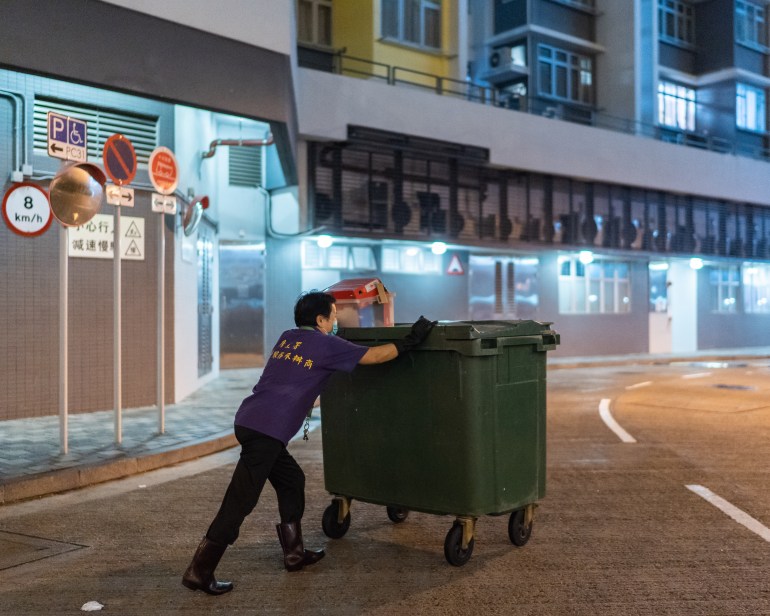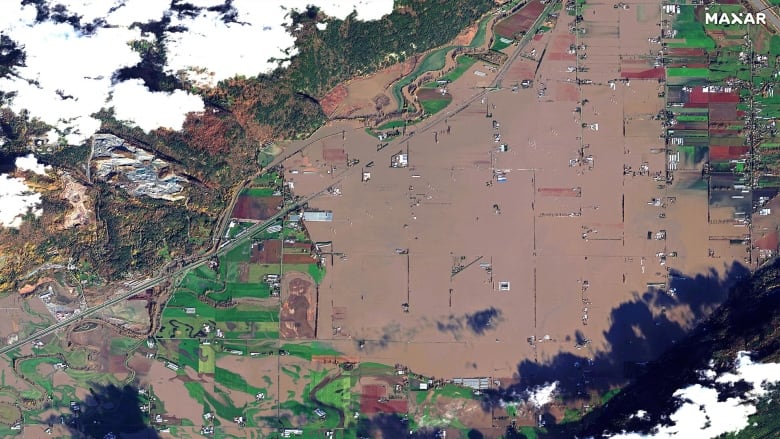After crackdown, Hong Kong’s low paid face hurdles to organising
Beijing’s clampdown on dissent in city has silenced unions and politicians that traditionally supported workers’ rights.

Hong Kong, China – When Foodpanda Hong Kong announced plans to reduce payments per order by another 2 Hong Kong dollars ($0.25) earlier this month, Ahmad and hundreds of other riders went on strike.
“This was the boiling point,” said Ahmad, who asked to use a pseudonym due to fears of reprisal. “Everyone was very angry. They didn’t want to work for such low pay.”
KEEP READING
Is the activist economy good for social change?
Tunisian labour union opposes parliament return, urges elections
Tunisia trade union calls for strike over death of protester
US: Deere union workers approve new contact, end strike
The Pakistani joined the food delivery platform during the height of the pandemic in 2020 when his trading business closed along with the city’s borders.
Barely taking any time off each week, he could earn up to 30,000 Hong Kong dollars ($3,850) a month to support his family of four. However, as restaurants reopened and demand for food delivery dropped, the company chipped away at couriers’ incomes by steadily reducing their pay per order.
By October, it was difficult for Ahmad to earn even 25,000 Hong Kong dollars ($3,209) per month, one-fifth of which went to the maintenance of his motorcycle.
Soon after Foodpanda announced the pay cut, several hundred members of the fleet flocked to a Telegram group first set up by couriers to discuss technical issues in the company’s app.
“People came like flies,” Ahmad recalled, fueled by mounting grievances over pay, arbitrary account suspension and unreasonable penalties, among other issues.
“We are humans, not dogs,” read the signs workers attached to their motorcycles and bikes during the subsequent November 13-14 strike, which successfully forced Foodpanda to the negotiating table, where its executives on Thursday agreed to a more generous compensation package.
The plight of gig workers is not unique to Hong Kong, but those in the global financial centre now tread a particularly fine line.
In one of the most unequal cities on earth, workers are up against not only their companies under laws that notoriously favour employers over employees, but also a government that is increasingly intolerant of any form of organising and dissent.
 The pro-democracy Hong Kong Confederation of Trade Unions voted to disband last month citing political pressure following the passage of a sweeping national security law [File: Tyrone Siu/Reuters]
The pro-democracy Hong Kong Confederation of Trade Unions voted to disband last month citing political pressure following the passage of a sweeping national security law [File: Tyrone Siu/Reuters]Last month, the Confederation of Trade Unions (CTU), the city’s largest independent union coalition, announced its decision to disband, joining a long list of civil society organisations that have buckled under the pressure of a sweeping national security law imposed by Beijing following mass pro-democracy protests in 2019.
The CTU’s founder and other union leaders are behind bars for their role in the protests or alleged violations of the national security law, which has wiped out practically all political opposition and silenced pro-democracy organisations and media in the former British colony. Beijing and the Hong Kong government have praised the security law for restoring peace and stability to the city after months of often violent protests.
Without the umbrella group, labour unions are left as “a snail without its shell,” as one former member put it.
The changed political atmosphere has been felt among workers organising on the ground, too.
As Foodpanda couriers’ representatives were bargaining with the company on Wednesday, dozens of riders rallying outside were warned by police against participating in an unauthorised assembly and threatened with fines for violating social distancing rules.
The CTU’s dissolution was inevitable after a relatively free political system that ensured plurality in the decades following the city’s 1997 transfer to Chinese sovereignty disappeared overnight, said executive member Denny To, speaking from the umbrella group’s former office in the bustling Mong Kok district.
“The way forward is something we must find out on our own,” To said. “The work of a labour union is long and slow. Whether it is sustainable after decentralisation remains a question.”
 Hong Kong has some of the most severe wealth inequality on the planet [File: Chan Long Hei]
Hong Kong has some of the most severe wealth inequality on the planet [File: Chan Long Hei]In 2017, To, who is also the head of the Cleaning Industry Service Workers Union, led cleaners at a public housing estate on a 10-day strike that resulted in the restoration of severance payments and a pay rise — a rare victory for grassroots workers.
His team worked tirelessly behind the scenes, raising money for workers during their strike, gathering support from residents and liaising with the media.
Their triumph sparked a wave of labour actions across public housing estates and pressed the Hong Kong government into amending the law in 2019. A new clause requires contractors to pay their employees an end-of-contract gratuity.
Yet as the cleaners’ contract drew to an end last month, they complained of their employer pulling an old trick: intimidating workers into quitting and thus surrendering their severance pay. Some cleaners said they had been fooled into signing additional contracts that denied their right to the gratuity, while a handful that refused said they were threatened with pay cuts and other penalties.
In today’s political environment, a repeat of To’s campaign on behalf of the cleaners is hard to imagine. The CTU is no longer around to provide the same support, while their allies in public office have been purged from the political system. Yeung Yuk, a district councillor who allied himself with the cleaners, was among more than 200 opposition councillors that resigned under pressure in July.
“Grassroots workers may not have a sharp political acumen, but they are not clueless,” To said. “They realise those on their side are disintegrating and it takes a huge toll on their confidence to speak out.”
To said he feared it was becoming difficult to amplify workers’ voices in Hong Kong, where advocates say labour protections are already lax and weakly enforced.
“Labour protections have always been weak in Hong Kong. Without our voice, the government may actively improve policies on its own only when pigs fly,” he said.
Ho Hung Hing, leader of the Catering and Hotel Industries Employees General Union, a former affiliate of the CTU, said the government had done little to uphold standards in the gig economy.
“Even without the CTU, our network will not disappear and we will continue to organise,” Ho said, “but without any representative in the parliamentary system, our advocacy can never reach the Legislative Council.”
Silver lining
There is, however, a silver lining, as the case of Foodpanda couriers shows. Though the company did not increase its fee per order, citing its global strategy, it agreed to suspend the rate cut till June of next year, pay bonuses during rush hour and offer other forms of compensation.
Speaking to the media after the agreement, Pedros Dias, Foodpanda’s operations director in Hong Kong, attributed the dispute to “miscommunication” with the fleet, although many riders complained they had few ways to make themselves heard.
Ho, who represented the Foodpanda riders during the negotiations, said the workers’ united stance had been key to their success, making a powerful statement that could not be ignored.
Though many of the progressive trade unions formed during the protests in 2019 have since dissolved under the political crackdown, Ho credits the social movement for inspiring a new political awakening and encouraging civic participation.
“A citywide strike might still be out of reach, but people realised that by going on strike, they are partaking in an industrial action that could influence the politics and economy of the city,” Ho said.
“Workers have come to understand that they have to speak out when they see something wrong. The vessel that holds unions together may be gone, but people are still alive and doing what they can in each of their own industries.”
As for Ahmad, he is back on his motorcycle. He was not completely satisfied with the strike’s outcome and admitted he had to compromise. But he is now delivering food with the knowledge that couriers can leverage their collective power to demand change.
“This is for our home, our family, and our survival in Hong Kong,” he said.















